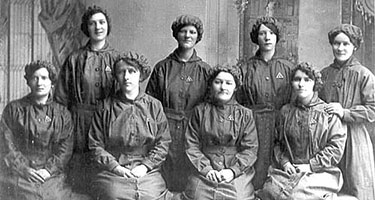The Home Front
Even here at home, ordinary people often found their everyday lives were affected by the conflict.
There was recruiting to be done – 200 more men for Col. Dobson’s Reserve Battalion, saddlers and harness makers for France, men needed for work at home. Refugees arrived from Belgium. There were even raids by a number of German airships, resulting in civil defence activity, subsequent blackouts and bombs dropped.
Until then, few people had thought airships could reach the Midlands; the sight of a Zeppelin hovering overhead soon changed their mind. Industrial and agricultural production was affected.
The war dramatically changed the lives of so many people here at home. Food rationing began, grassland had to be ploughed and pasture land used for growing crops. Locals were lectured on how to produce more food from their gardens and allotments.





